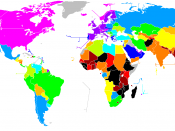ENVIRONMENTAL LAW
ENVIRONMENTAL LAW- ESSAY
Discuss the following principle and its application within EU and UK law: "The polluter pays".
1.Introduction
The polluter pays principle can be identified as one of the most significant principles that guide Environmental Law. Although it is complicated and sometimes diverse, it appears to be a main requirement for the regulation of pollution prevention and pollution control. However, many difficulties have risen in its application to both national and international fields, therefore a detailed explanation and identification of the principle is essential to be done.
"If anyone intentionally spoils the water of another...let him not only pay damages, but purify the stream or cistern which contains the water..." (Plato) . This is in a very general way the meaning of the polluter pays principle, more likely the origins of the principle. It applies to any kind of pollution and it has been discussed for many years, or centuries as one may say.
But currently it is relevant as a principle of the latest developments of environmental law, mostly related to the European Community Law.
It was the OECD which suggested the policy that the person who was responsible for creating the pollution shall be charged with the cost of the pollution prevention, control and restoration measures, and the UN/ECE one of the first that began to take into account such principle. The OECD defines the polluter pays as a means of "ensuring that the polluter (or resource consumer) should be charged with the cost of whatever pollution prevention and control measures are determined by the public authorities" .
The PPP was gradually adopted in the legislation of the UK, as it was embedded in the Environmental Protection Act 1990 and the Environment Act 1995 . But before that, it has been in...


